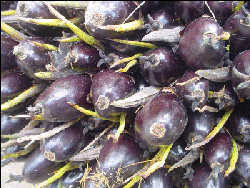ELAEIS GUINEENSIS - OBÉ PALM.
 Synonym
Synonym
Elaeis melanococca.
Common name
Obé palm, African oil palm, Corojo de Guinea, Palma Africana, Palma de aceite,
Palma oleaginosa Africana, You zong, Macaw fat, Palmier à huile, Palmier à huile d'Afrique, Ölpalme, Steinfrüchte,
wild oil palm.
Family
Palmae (Arecaceae).
Overview
A solitary palm with an erect stem growing up to 55' tall; it has an irregular set of
leaflets.
Leaves are pinnate, 4 - 5 m long, bearing 50-60 lanceolate pointed segments.
Although it is ringed; there are no spines except for short spines on the leaf base and within the fruit bunch;
it also lacks a crown shaft.
The cream colored male - and female inflorescences come from among the leaves.
They are densely packed with the fruit - bunches.
The fruit takes about six months to mature from the pollination
to maturity.
The weight varies from a few pounds to about 220 pound, according to age and situation.
However, in adults
plantations mean weights are 22 - to 66 lb.
There is also a great variety of hermaphrodite or mixed inflorescences formed.
The fruit, a sessile drupe, is
black when green, orange-red when ripe. The fruits are like plums, 1-1½" long, avoid in shape and reddish of
color.
In Surinam it is grown commercially for the production of palm kernel oil.
The palm oil (a high acidity oil) is extracted from the mesocarp, while the kernel oil (prime oil) comes from the
inside of the seeds.
The oil is rich in carotene and can be used as a substitute for cod liver oil in
correcting Vitamin A deficiency.
The oils are used for manufacturing of edible oil and margarine, while the fatty acids are used in the manufacturing
of soap.
The oil is today also utilized in the production of biodiesel since it has the highest oil content of
any fruit.
Palm kernel oil extracted from the kernel, contains about 50% oil.
There are many other nutritional effects of
palm oil; palm oil causes a progressive decrease in plasma cholesterol, anti-Thrombotic shows a reduced tendency
for blood to clot.
Palm oil is a natural source of Vitamin E (tocopherols, and tocotrienols).
Medicinal applications
The oil is used against headaches and rheumatism.
It is also used as a diuretic
and anodyne.
Hardiness
USDA zone 9B - 11.
Propagation
Seeds.
Culture
Full sun, well drained, clay - to poor soils; needs high humidity.
Can withstand
short spells if light frost.
The seeds can take up to six month to germinate; it may help to crack, the seeds
to speed-up germination.
|

